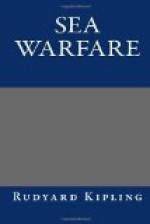If lost hounds could speak when they cast up next day, after an unchecked night among the wild life of the dark, they would talk much as our destroyers do.
The doorkeepers of Zion,
They do not always
stand
In helmet and whole armour,
With halberds
in their hand;
But, being sure of Zion,
And all her mysteries,
They rest awhile in Zion,
Sit down and smile in Zion;
Ay, even jest in Zion,
In Zion, at their
ease.
The gatekeepers of Baal,
They dare not
sit or lean,
But fume and fret and posture
And foam and curse
between;
For being bound to Baal,
Whose sacrifice
is vain,
Their rest is scant with Baal,
They glare and pant for Baal,
They mouth and rant for Baal,
For Baal in their
pain.
But we will go to Zion,
By choice and
not through dread,
With these our present comrades
And those our
present dead;
And, being free of Zion
In both her fellowships,
Sit down and sup in Zion—
Stand up and drink in Zion
Whatever cup in Zion
Is offered to
our lips!
III
THE MEANING OF “JOSS”
A YOUNG OFFICER’S LETTER
As one digs deeper into the records, one sees the various temperaments of men revealing themselves through all the formal wording. One commander may be an expert in torpedo-work, whose first care is how and where his shots went, and whether, under all circumstances of pace, light, and angle, the best had been achieved. Destroyers do not carry unlimited stocks of torpedoes. It rests with commanders whether they shall spend with a free hand at first or save for night-work ahead—risk a possible while he is yet afloat, or hang on coldly for a certainty. So in the old whaling days did the harponeer bring up or back off his boat till some shift of the great fish’s bulk gave him sure opening at the deep-seated life.




